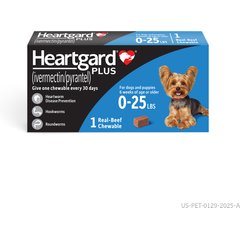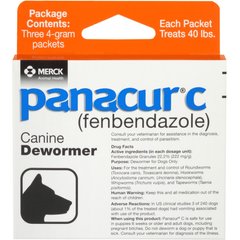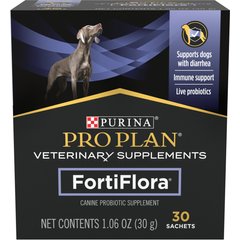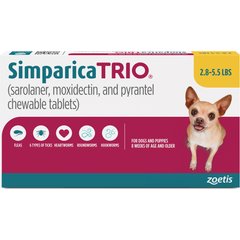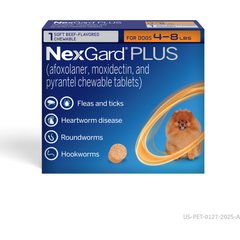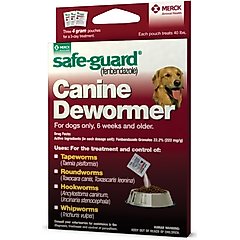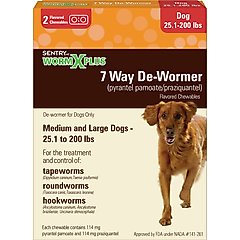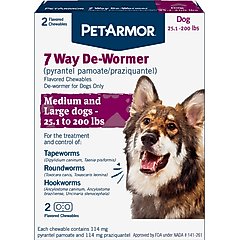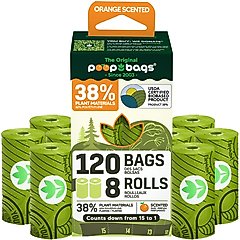What Are Roundworms in Dogs? What Are the Signs?
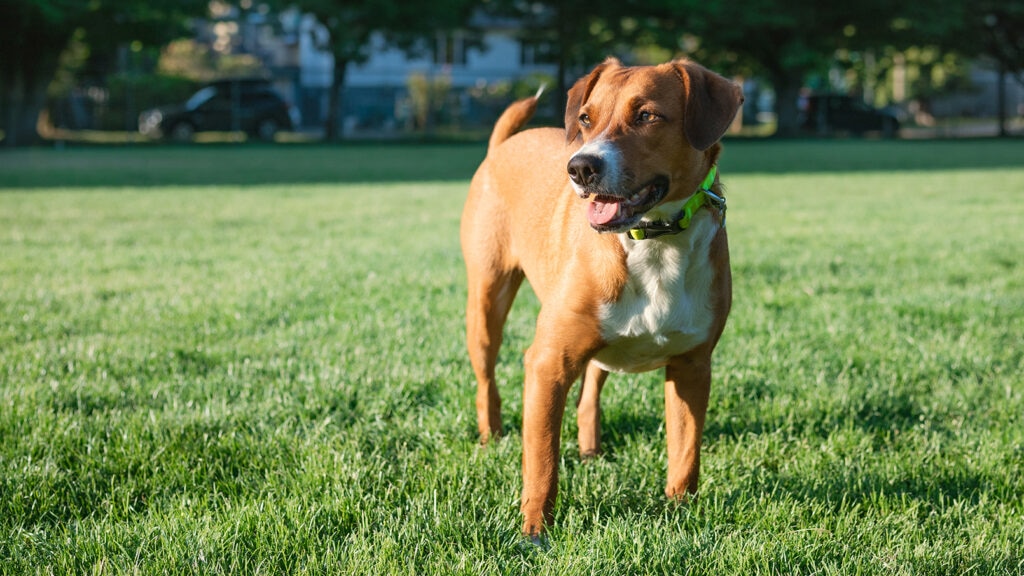
Photo by Petra Richli/iStock/Getty Images Plus
Roundworms are one of the most common intestinal parasites found in dogs. These worms are long and white and resemble spaghetti (or, if you’re into more obscure culinary analogies, mung bean sprouts).
Left untreated, roundworms in dogs can cause uncomfortable symptoms and even serious health issues. Fortunately, these worms are usually easy to treat, but spotting the signs early can be a little tricky.
Here’s everything you need to know about these troublesome parasites, including how they affect your dog, the signs to look out for, and how they’re treated.
Key Takeaways
- Roundworms are common in dogs, especially puppies, and can cause symptoms such as diarrhea, vomiting, and a pot-bellied look.
- Dogs can pick up roundworms in several ways, such as from eating infected animals, playing in contaminated soil, or even contracting them from their mom.
- Roundworms can spread to humans, so it’s important to clean up after your dog and wash your hands often.
- The good news: Roundworms are easy to treat with vet-prescribed deworming meds and a follow-up stool check to make sure they’re gone for good.
What Are Roundworms?
Roundworms (aka ascaridoid nematodes) are large intestinal parasites commonly found in dogs’ intestines. These parasites feed off partially digested food in the intestines.
Their name is derived from their tubular or “round” shape. There are two main species of roundworms—Toxocara canis (T. canis) and Toxascaris leonina—with T. canis being the most common.
Almost every dog will experience roundworms at some point in their life, typically during puppyhood, but adult dogs can get them too.
What Are the Signs of Roundworms in Dogs?
The signs of roundworms in dogs can be subtle at first.
In puppies, many of the symptoms develop because the roundworms feed on the same nutrients in the small intestine that the puppy needs for proper growth.
Here are the most common roundworm symptoms in dogs to watch for:
- Visible worms in stool or vomit
- Pot-bellied appearance
- Diarrhea with mucus
- Vomiting
- Lethargy
- Coughing or gagging (this occurs when roundworms migrate to the lungs)
- Poor coat condition
- Weight loss or poor appetite
- Lack of growth (in puppies)
If you notice any of these symptoms, contact your vet ASAP, as early detection and treatment are key to a quick recovery.
What Do Roundworms Look Like in Dog Poop?
If the infection is severe, you might be able to see roundworms in your dog’s feces.
Roundworms in dog poop appear as long white or light-brown strands, ranging from a few inches to about 7 inches long. They might be moving or curled up.
However, just because you don’t see any worms in your dog’s poop doesn’t mean they don’t have an infection. To find them, your vet may need to analyze a stool sample looking for roundworm eggs that can only be seen under a microscope.
What Causes Roundworm Infections in Dogs?
According to Colleen Guilfoyle, DVM, national shelter medicine veterinarian at Best Friends Animal Society, in Kanab, Utah, dogs can become infected in several ways, including:
- Contact with contaminated soil: Dogs can ingest roundworm eggs from soil that has been contaminated with infected feces.
- Ingestion of infected rodents or wildlife: Dogs can contract roundworms by eating infected animals, such as rodents, birds, and earthworms.
- Transmission from mother to puppies: Puppies can inherit roundworm infections from their mother, either through the placenta or while nursing.
- Ingestion of contaminated water: Dogs can ingest roundworm eggs from drinking water contaminated with infected feces.
Once inside the body, the eggs hatch and release larvae that travel through the lungs and liver before settling in the small intestine. There, they mature into adult worms, mate, and produce eggs, continuing the cycle of infection.
Can People Get Worms From Dogs?
Another reason it’s so important to address a roundworm infection quickly is that dogs can pass roundworms to humans, especially children.
“This happens when a person accidentally swallows roundworm eggs,” Dr. Guilfoyle says. “The eggs are usually found in dirt, sand, or on surfaces that have been contaminated with dog feces.”
If someone touches these contaminated areas and doesn’t wash their hands before eating or touching their mouth, they could become infected, Dr. Guilfoyle explains. In humans, roundworms can migrate through the body, potentially damaging organs.
How Do Vets Treat Roundworms in Dogs?
“Vets diagnose roundworms by testing a small sample of the dog’s stool,” Dr. Guilfoyle says. “They use a microscope to look for roundworm eggs, which are too small to see with the naked eye.”
She adds that in some cases, full-grown worms might be seen in the dog’s poop or vomit, especially in puppies.
Roundworm infections in dogs can be serious if not treated, particularly in puppies, warns Jamie Richardson, BVetMed, head of veterinary medicine at Small Door Vet, in New York, New York.
These parasites can cause vomiting, diarrhea, and stunted growth, and in more severe cases, they can lead to intestinal blockage or even death, Dr. Richardson explains.
Thankfully, with prompt care, most dogs fully recover from roundworms. A vet will typically treat a roundworm infection with the following:
- Deworming medication: Vets prescribe medications, such as pyrantel pamoate or fenbendazole, that kill the worms living in the dog’s intestines, Dr. Guilfoyle says. Medications for roundworms in dogs are usually given orally.
Recommended Products
- Follow-up treatment: “Follow-up treatments are often needed because the medication only kills adult worms, not immature ones that may still be developing,” Dr. Richardson says.
- Stool sample checks: Once the last course of medication is finished, Carly Fox, DVM, senior veterinarian in the emergency and critical care department at the Schwarzman Animal Medical Center, in New York, New York, recommends following up with your vet to submit another stool sample to ensure the roundworms are completely gone.
“Luckily, deworming medications work quickly,” Dr. Fox says. “Most are effective within 24–72 hours.”
However, she notes that depending on the severity of the infection, symptoms such as diarrhea can continue after treatment for up to two to three weeks.
“If your pet has diarrhea associated with roundworm infection, ask your vet for recommendations for a probiotic, like Purina Pro Plan FortiFlora, to help with gut recovery,” Dr. Fox suggests.
Recommended Product
How Can I Prevent a Roundworm Infection in My Dog?
You can reduce the chance of your dog getting roundworms and other intestinal parasites by staying on top of preventive care.
Here are some key steps to take.
Keep Your Dog on a Deworming Schedule
Consistent use of parasite preventives can safeguard your dog against various internal parasites, including roundworms.
The following options provide broad-spectrum protection by targeting multiple types of parasites:
- Heartgard Plus Chews: Protects against heartworms, roundworms, and hookworms
Recommended Product
- Simparica Trio Chewable Tablets: Protects against fleas, ticks, heartworms, roundworms, and hookworms
Recommended Product
- NexGard PLUS Chewables: Protects against fleas, ticks, heartworms, roundworms, and hookworms
Recommended Product
If you’re looking for medications that target only intestinal worms, here are a few highly rated options:
- Safe-Guard Canine Dewormer: Treats and controls roundworms, hookworms, tapeworms, and whipworms
Recommended Product
- Sentry HC WormX Plus 7 Way Dewormer: Treats and controls seven strains of worms, including tapeworms, roundworms, and hookworms
Recommended Product
- PetArmor 7 Way Dewormer: Treats and controls seven strains of worms, including tapeworms, roundworms, and hookworms
Recommended Product
Ask your vet which option is best for your pup.
Clean Up After Your Dog
Be proactive about cleaning up your dog’s poop right away, as roundworms and their eggs can linger in feces.
Use dog poop bags, such as The Original Poop Bags, to pick up the poop without touching it, and dispose of it in a trash can immediately afterward.
Recommended Product
Always wash your hands thoroughly after cleaning up after your dog or touching anything that might have come into contact with their poop.
Keep Your Environment Clean
Regularly clean your home by wiping down surfaces and vacuuming carpets and furniture, especially in areas where your dog spends the most time. This helps reduce the risk of your dog encountering roundworm eggs and other potential sources of infection.
If your dog contracts a roundworm infection, Dr. Fox suggests thoroughly cleaning your home during and after your dog’s recovery to prevent reinfection.
Limit Exposure To Infected Environments
Always keep a close eye on your dog while walking in parks, yards, or areas where other dogs or wildlife might have left behind feces.
Make sure your dog doesn’t eat or sniff other animals’ poop or dead animals, such as rodents or birds, as these can carry roundworm eggs.
Deworm Pregnant Dogs and Newborn Puppies
In a pregnant dog, roundworm larvae can cross the placenta, infecting the puppies before birth. The larvae can also be transmitted through the mother’s milk during nursing.
To minimize the risk, it’s recommended to deworm pregnant dogs late in their pregnancy, typically around the 40-day mark. This helps reduce the likelihood of the puppies being born with roundworms.
Once the puppies are born, begin deworming at 2 weeks old to protect them from parasites they might pick up from their environment or their mother.
Take Your Dog to Regular Vet Checkups
Routine vet checkups can help catch roundworm infections early, before they become serious.
“Make sure to bring in a stool sample to all of your dog’s yearly checkups with your general practitioner for testing,” Dr. Fox says. “It’s an easy, noninvasive test to make sure your dog is parasite-free.”
FAQs About Roundworms in Dogs
How do you treat roundworms in dogs at home?
While you can’t treat roundworms at home without veterinary support, you can help by following your vet’s prescribed deworming plan. This typically involves giving your dog deworming medications.
How contagious are roundworms from dog to human?
Roundworms are zoonotic, meaning they can be transmitted from dogs to humans, particularly if people come into contact with contaminated feces or soil.
Always wash your hands thoroughly after cleaning up your dog’s poop.
Can dogs get roundworms more than once?
Yes, dogs can get roundworms more than once, especially if they are exposed to contaminated environments, such as parks, yards, or areas where other dogs or wildlife have left behind feces.
Routine deworming, proper hygiene, and keeping your dog away from potential sources of roundworm eggs can reduce the risk of reinfection.
How long does it take to get rid of roundworms in dogs?
“Most dogs start to feel better within a few days of receiving deworming medication, but it typically takes two to three weeks to fully clear the infection,” Dr. Richardson says.
